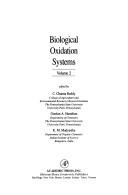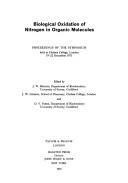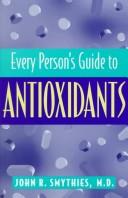| Listing 1 - 10 of 39 | << page >> |
Sort by
|
Book
Year: 1927 Publisher: Paris : Presses universitaires de France,
Abstract | Keywords | Export | Availability | Bookmark
 Loading...
Loading...Choose an application
- Reference Manager
- EndNote
- RefWorks (Direct export to RefWorks)
Book
Year: 1914 Publisher: Jena, : Fischer,
Abstract | Keywords | Export | Availability | Bookmark
 Loading...
Loading...Choose an application
- Reference Manager
- EndNote
- RefWorks (Direct export to RefWorks)
Oxidation, Physiological. --- Oxidation, Physiological. --- Oxydation biologique.
Book
Abstract | Keywords | Export | Availability | Bookmark
 Loading...
Loading...Choose an application
- Reference Manager
- EndNote
- RefWorks (Direct export to RefWorks)
Book
Year: 1967 Publisher: New York (N.Y.) : Academic press,
Abstract | Keywords | Export | Availability | Bookmark
 Loading...
Loading...Choose an application
- Reference Manager
- EndNote
- RefWorks (Direct export to RefWorks)
Mitochondria. --- Oxidation, Physiological. --- Phosphorylation.

ISBN: 0125845510 Year: 1990 Publisher: San Diego (Calif.) : Academic press,
Abstract | Keywords | Export | Availability | Bookmark
 Loading...
Loading...Choose an application
- Reference Manager
- EndNote
- RefWorks (Direct export to RefWorks)
Book
Year: 1937 Publisher: Budapest : K. Rényi,
Abstract | Keywords | Export | Availability | Bookmark
 Loading...
Loading...Choose an application
- Reference Manager
- EndNote
- RefWorks (Direct export to RefWorks)
Book
Year: 1930 Publisher: Paris : Les Presses universitaires de France,
Abstract | Keywords | Export | Availability | Bookmark
 Loading...
Loading...Choose an application
- Reference Manager
- EndNote
- RefWorks (Direct export to RefWorks)

ISBN: 0850660580 Year: 1972 Publisher: London Taylor and Francis
Abstract | Keywords | Export | Availability | Bookmark
 Loading...
Loading...Choose an application
- Reference Manager
- EndNote
- RefWorks (Direct export to RefWorks)
Organonitrogen compounds --- Oxidation, Physiological --- Congresses --- Congresses
Book
ISBN: 0123786231 Year: 2009 Publisher: London, United Kingdom : Elsevier,
Abstract | Keywords | Export | Availability | Bookmark
 Loading...
Loading...Choose an application
- Reference Manager
- EndNote
- RefWorks (Direct export to RefWorks)
The field of redox is rapidly changing, specifically in relation to plants where redox reactions are exacerbated compared to non-photosynthetic organisms. The development of proteomics has allowed the identification of hundreds of molecular targets of these systems, and the recent discovery of glutaredoxin's ability to bind iron sulfur centers (ISCs) and to participate in ISC assembly in other apoproteins has provided many new insights. This volume presents new research on oxidative stress in plants, ranging from the production of reactive oxygen species or reactive nitrogen species, to the
Plant defenses. --- Oxidation, Physiological. --- Plants --- Metabolism.

ISBN: 0813556155 0585023085 9780585023083 0813525748 0813525756 Year: 1998 Publisher: New Brunswick, N.J. Rutgers University Press
Abstract | Keywords | Export | Availability | Bookmark
 Loading...
Loading...Choose an application
- Reference Manager
- EndNote
- RefWorks (Direct export to RefWorks)
What are antioxidants? What do they do? Should you be taking them? How much is enough, or too much? Dr. John Smythies explores these and other questions you need to have answered about antioxidants in Every Persons Guide to Antioxidants. Oxidants are naturally occuring chemicals in our bodies that derive from oxygen to facilitate essential biochemical processes. However, most oxidants are potentially toxic molecules and the body contains a number of antioxidants for protection against these toxic effects. Overproduction of oxidants, or underproduction of antioxidants, leads to oxidative stress, which has been linked to a wide range of chronic diseases, including heart disease, cancer, diabetes, and Alzheimers. Smythies thoroughly evaluates current scientific work on this subject and suggests that a high proportion of many of these diseases can be prevented, or their onset delayed, by proper intake of antioxidants. He examines the pros and cons of the debate over how this necessary intake should be achieved, by eating more fruits and vegetables or by taking supplements in pill form. Smythies surveys the toxicity of antioxidants and recommends under what circumstances they should be given with caution or not at all. He also discusses whether taking supplements requires medical supervision and lists good sources of antioxidants in fruits and vegetables
Oxidation, Physiological --- Antioxidants --- Free Radicals (Chemistry) --- Science --- Medical --- Oxidation, physiological --- Free radicals (chemistry)
| Listing 1 - 10 of 39 | << page >> |
Sort by
|

 Search
Search Feedback
Feedback About UniCat
About UniCat  Help
Help News
News